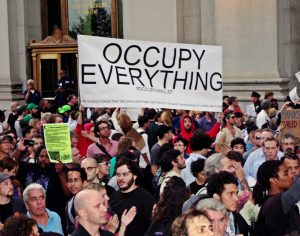slacktivism (noun)
Pronunciation: /ˈslaktəˌvizəm/
Definition of slacktivism in English:
Actions performed via the Internet in support of a political or social cause but regarded as requiring little time or involvement, e.g., signing an online petition or joining a campaign group on a social media website.
Oxford Dictionaries, Oxford University Press.

The Occupy Movement
MEANING, WHAT MEANING?
Since the #OccupyWallStreet movement began in September 2011, both the verb “to occupy” and the hashtag of #Occupy[insert_anything_you_dislike] have come to serve as euphemisms for endorsing a virtual rebellion against an organization perceived to oppress the non-elite (the 99%). To occupy something no longer means to be present within or to inhabit a certain space as protesters did in the original #OccupyWallStreet demonstrations (and as protesters have done for hundreds of years in displays of powerful social statements). In fact, “occupying” has come to mean simply being against a perceived powerful entity and demanding to overtake and change that entity from the comfort of one’s smartphone and Twitter client and Facebook page. It has become a cliché that is not only devoid of meaning but actually antithetical to its original meaning and a way in which “occupiers” feel as if they are committing social-justice activism without being at all present or active (thus, “slacktivists”). The intent is good, but the work it takes in order to create meaningful institutional change is lacking and today’s occupiers are deceived by technology and PR into thinking that they have committed radical acts leading to revolution. Simply put, a slightly modified hashtag does not another Arab Spring make just as purchasing the ubiquitous Che Guevara t-shirt does not dismantle capitalism (actually, it perpetuates it).
A HASHTAG IS NOT A REVOLUTION (NEITHER IS A BROWSER EXTENSION)
Such is the case with the latest #Occupy sub-cause to take to the Web: #OccupyTheBookstore, which is not a political movement rather a for-profit entrepreneurial endeavor in the form of a Google Chrome browser extension being branded as a mass act of standing up to “the man” (another cliché, this time the general stand-in for any nebulous authority/power figure — in this case, the bookstore or publisher though as with many of the #Occupy sentiments, to whom the anger should be directed is unclear). As you may have gathered, no bookstores will be actually occupied and no major changes to the deeply flawed textbook industry will result from a hashtag and a browser add-on. This is not a revolution or a movement, it is access to existing technology promoting itself by jumping on the social-justice trending bandwagon. Want to give your product attention? #OccupyIt. Even if that’s in no way what you’re actually doing.
CAN’T WE ALREADY DO THIS?
To be clear, entrepreneurship is a driver of innovation and a deliverer of options and the intent here (as within most #Occupy sub-causes) is a good one and it is in keeping with the spirit of increased economic fairness by decreasing the financial burden on the 99% and narrowing the wealth gap. Pretty much the only people who don’t want greater availability of cheaper textbooks for college students are textbook publishers. But this latest #Occupy stunt is not new nor is it a revolution and browser extensions that do what price-comparison websites like CampusBooks.com have been doing for nearly a decade now — showing students where to get cheap textbooks by showing those students all of their shopping options on one screen of search results — already exist. There’s nothing new in #OccupyTheBookstore, it’s just being repackaged and rebranded to appeal to the #Occupy generation.
IS MARKETING FOR PROFIT IN THE SPIRIT OF THE #OCCUPY MOVEMENT?
In addition to #OccupyTheBookstore piggybacking onto an already-established feel-good brand (make no mistake, #Occupy is a brand, which is ironic given its connection with Adbusters though less so when one looks at the magazine’s “Culture Shop” selling fashionable goods for the hip slacktivist ) and providing nothing that a user cannot already easily access on a single site while it, the extension is integrated within the Google Chrome browser. While we all have our preferences with regard to Web browsers and we understand that all browsers have drawbacks in terms of performance and privacy, using Chrome and Google products in general is, in essence, giving your personal information and consumer habits away to a company that uses that data to target you going forward. Does that sound like something that the original #Occupy movement stood for? Does it sound like something that is in the benefit of the 99% or does it sound like a marketing campaign that subverts the spirit of activism for the benefit of those who profit from big data and subsequent targeted efforts? Thus, it is important to ask: Is #OccupyTheBookstore taking a stand against the commercial status quo that makes more money for the elite minority or is it timely posturing to co-opt a once-cause, now-played-out meme for the benefit of the entrepreneurs behind a browser extension?
THE REAL ISSUE CANNOT BE “OCCUPIED”
The high cost of textbooks (and more largely, the issue of enormous debt taken on by students pursuing higher education) is real and it is important and it does need addressing. Tools and products such as textbook price-comparison websites, textbook rental programs, eTextbooks, and open-source textbooks are real solutions that put real pressure on the old new/used-text physical-bookstore model. Industry changes as well as legislation that supports college students and protects them from incurring lifelong student-loan debt can indeed be achieved but no one should believe that a for-profit software script and a hashtag will bring about a needed revolution.

